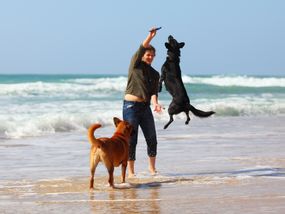
Many senior dogs experience arthritis as they age. According to the American College of Veterinary Surgeons, about 25% of all dogs develop osteoarthritis. Knowing the facts might help you understand how to recognize and address this common disease if it develops in your canine companion.
A Guide to Canine Arthritis
What is arthritis in dogs?
Arthritis is a chronic joint disease that occurs when the cartilage around the joints is lost. When the joint capsule thickens and new bone forms around the area, it makes movement painful and reduces the animal’s limb function.
Why do canines develop osteoarthritis?
 Most dogs develop OA after experiencing orthopedic conditions, including a dislocated knee cap or elbow or hip dysplasia. Big dogs — including German shepherds, Great Danes, and Labrador retrievers — are prone to suffer from arthritis. Factors such as age, body weight, exercise, and diet contribute to the disorder developing in both large and small breeds.
Most dogs develop OA after experiencing orthopedic conditions, including a dislocated knee cap or elbow or hip dysplasia. Big dogs — including German shepherds, Great Danes, and Labrador retrievers — are prone to suffer from arthritis. Factors such as age, body weight, exercise, and diet contribute to the disorder developing in both large and small breeds.
What are the signs and symptoms of canine arthritis?
An active dog that becomes less willing to play or exercise, can’t jump, appears stiff, or starts walking differently may have arthritis. If you observe changes in your dog’s behavior, such as expressions of pain or discomfort when they move their leg or increased aggressiveness, OA may be the reason.
How do veterinarians treat dogs with arthritis?
Conservative approaches include weight control and pain reduction with nonsteroidal anti-inflammatory drugs. Minimizing high-impact activities and improving joint movements through walking and swimming helps strengthen muscles and joints.
Total joint replacement is a surgical procedure that can offer relief. Have a veterinary professional observe your pet’s condition to determine which treatment is needed.
If you notice your dog is uncomfortable when moving, take them to Cedarknoll Animal Hospital in Montgomery, NY. Knowledgeable and caring veterinarians provide in-house diagnostic services, pet health exams, and treatments, including surgery options. These veterinary doctors are committed to helping animals enjoy long and active lives. Visit their website for more information about what they do or call (845) 361-5404 to schedule an appointment.
About the Business
Have a question? Ask the experts!
Send your question

